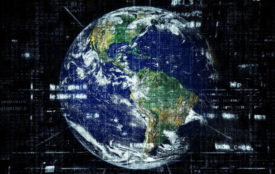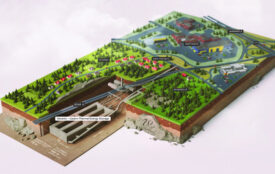Economic losses from hurricanes become too big to be offset by the US if warming continues
Hurricane damages can increase due to increasing global temperatures, caused by greenhouse gas emissions from fossil fuels. Computer simulations of regional economic sectors and supply chains in the US now show that the resulting economic losses can at some point not be nationally offset under unabated warming.
If too many factories and the like are hit by the hurricane and stop working, other countries will have to step in to provide the supply of goods, according to the scientists who did the study. The hurricane impacts under global warming will thus give the US an economic disadvantage, the warmer the more.
“Tropical cyclones draw their energy from ocean surface heat. Also, warmer air can hold more water which eventually can get released in heavy rains and flooding that often occur when a hurricane makes landfall,” says Robin Middelanis from the Potsdam Institute for Climate Impact Research (PIK) and Potsdam University, lead author of the study. “It’s thus clear since long that hurricane damages will become bigger if we continue to heat up our Earth system.” While we might not have more hurricanes in the future, the strongest among them could get more devastating.
“Now, one of the important questions is: can we deal with that, economically? The answer is: not like this, we can’t,” says Middelanis. “Our calculations show, for the first time, that the US economy as one of the strongest on our planet, will eventually not be able to offset the losses in their supply chains on their own. Increasing hurricane damages will exceed the coping capacities of this economic super-power.”
Local production losses propagate throughout supply chain networks
The scientists looked at the 2017 hurricane Harvey that hit Texas and Louisiana and already then cost the enormous sum of 125 billion US Dollars in direct damages alone, and computed what its impacts would be like under different levels of warming. Importantly, losses from local business interruption propagate through the national and global supply chain network, leading to additional indirect economic effects. In their simulations of over 7000 regional economic sectors with more than 1.8 million supply chain connections, the scientists find that the US national economy’s supply chains cannot compensate future local production losses from hurricanes if climate change continues.
“We investigated global warming levels of up to 5°C – which unfortunately might be reached by the end of our century if climate policy fails us,” says Anders Levermann, head of complexity science at PIK and scientist at New York’s Columbia University, a co-author of the study. “We do not want to quantify temperature thresholds for the limit of adaptation of the US economy’s national supply chains, since we feel there’s too much uncertainty involved. Yet we are certain that eventually the US economy’s supply chain capacities as they are now will not be enough if global warming continues. There is a limit of how much the US economy can take, we just don’t know exactly where it is.”
“Bad for people”
Ironically, in the case of hurricane Harvey it is in particular the oil and gas industry in Texas which suffers from the impacts of hurricanes driven by global warming – while global warming is in turn driven by the emissions from burning oil and gas, plus of course coal. The fossil fuel extraction sector is big in that region of the US, and it is vulnerable to cyclone damages. The computer simulations show that production losses in the fuel sector will be amongst those which will be most strongly compensated by countries like Canada and Norway, but also Venezuela and Indonesia, at the expense of the US economy.
“When things break and production fails locally, there’s always someone in the world who is happy to make money by selling the replacement goods,” says Levermann. “So why worry? Well, reduced production means increasing prices, and even if that means it’s good for some economies, it is generally bad for the consumers – the people. Also from a global economic perspective, shifts due to disrupted supply chains can mean that less efficient producers step in. It’s a pragmatic, straightforward conclusion that we need to avoid increasing greenhouse gas emissions which amplify this kind of disruptions.”








